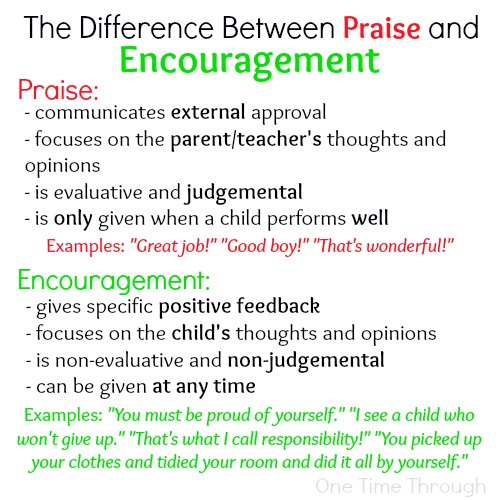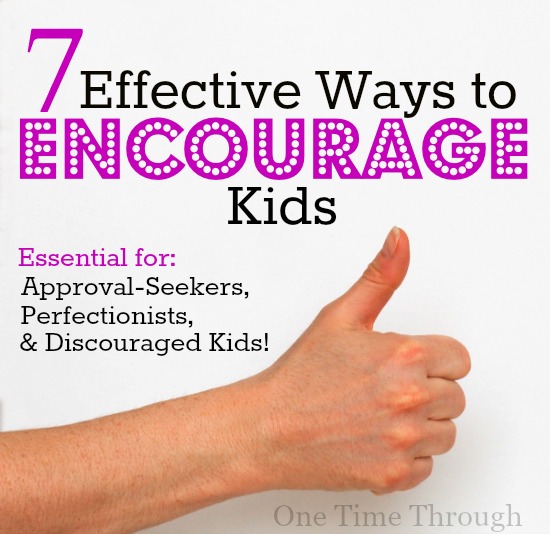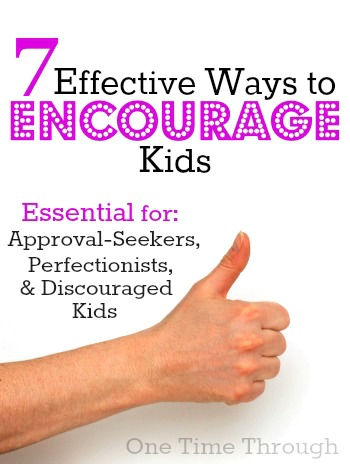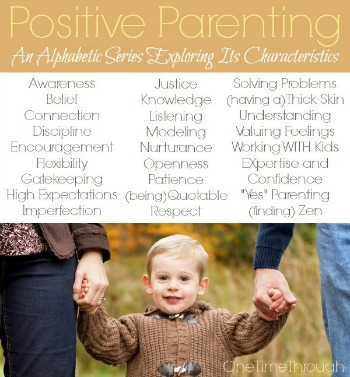Welcome to another week of the Positive Parenting alphabetic series. This week’s topic is Encouragement. We’ll be discussing what it is and how it differs from praise, as well as 7 times when it can, and should be, used to effectively encourage children.
This post contains Amazon Affiliate links. To find our more, read our Disclosure.
As an elementary teacher, I can tell you how common it is to have a few kids in a classroom who are constantly seeking external approval. They usually say things like, “Do you like this Ms. Lively?” or “Is this okay Ms. Lively?”
Many times they seem unable to decide for themselves that something they have done is worthwhile. Sometimes they seem addicted or even just dependent on this praise to function.
Then, on the flipside, there are also usually a few kids who are so discouraged that they find it difficult to achieve.
These might be the perfectionists who get so hung up on being perfect that they struggle to begin a project, or it never seems to get done (because it can never be just right.)
I once taught a boy who would tear up his work in frustration when he couldn’t get it to meet his own expectations.
Sometimes discouraged kids don’t even try, because they’re afraid of another failure.
In all three cases, there are many reasons why kids develop these behaviours. It’s usually a combination of temperament, personality, past history of successes and failures, and how they’ve been encouraged and/or praised in the past.
When I first read the book How to Talk So Kids Will Listen & Listen So Kids Will Talk on my maternity leave, I learned about the differences between encouragement and praise, and realized that I had been praising in my classroom instead of encouraging.
“Great job!” was heard at least 10 times in my class on a daily basis.
I also realized that what I was saying to these 3 types of kids, probably was not helpful, and maybe even making things worse.

To the perfectionist child, I was saying things like, “This is fine. It doesn’t have to be perfect. Don’t worry about it.”
To the discouraged child, I would try a variety of things and then feel discouraged myself that what I had said hadn’t made much of a difference.
I tried words like, “Come on, I know you can do it. Just try starting and you’ll be fine. It will get easier the more you try.”
So why were these words not helpful?
In the first case, I was praising the child instead of encouraging them. My words of approval were actually reinforcing his/her behaviour and not encouraging her to evaluate her own work.
I can imagine them thinking, “It’s okay with her. Okay – good. I’m good enough for my teacher.”
With the perfectionist, I was minimizing their concerns instead of helping them to see their strengths and accomplishments.
I can imagine them thinking, “But I still want it to be perfect, no matter what you say.”
With the discouraged child, I was failing to acknowledge the difficulty of the task for them and like above, not helping them see their strengths.
I can imagine them thinking, “It doesn’t matter what she says, I’m no good at this. I’m not going to do this and fail again.”
Well – I can tell you that after 3 1/2 years of this parenting journey, and after reading countless parenting books, talking to other moms and dads, and participating in a number of parenting workshops, I will be a completely different (and more effective!) teacher when I return to work.
The big idea that I have learned is that HOW we speak to our kids when they are discouraged, or even when they are achieving well, can have a powerful impact upon how they think about themselves and their achievements.
Kids NEED positive feedback , but ideally we want to give it to them in a way that will help them to:
A) See and evaluate their own strengths,
B) Feel good about themselves (without needing external approval), and
C) Learn what’s appropriate and valued by the community.
“We have to find ways for [children] to tell their own stories, paint their own pictures, construct their own worlds, act out their own scenarios, and keep their own dreams alive.”
~Brian and Shirley Sutton-Smith, authors of How to Play with Your Child
Let’s look at 7 different times when kids need encouragement – and what you can say that will help.
I’ve gathered these ideas from a variety of parenting resources and experts. You can find many of them listed in my Positive Parenting Book List.
7 Ways to Encourage Kids
 Situation 1: When a Child Seeks Approval (Translation: the Approval Junkie)
Situation 1: When a Child Seeks Approval (Translation: the Approval Junkie)
Instead of feeding into that approval cycle mentioned above, we can give positive feedback and respond in a way that helps the child evaluate themselves.
Child: “Do you like this picture I drew?”
Parent/Teacher Encouraging Response: “I see you used lots of different colours and stayed within the lines. Are you happy with it? What do you like the best?”
Take Home Idea: DESCRIBE what you see to give feedback. Avoid your own evaluations. Prompt the child to evaluate themselves.
Source: How to Talk So Kids Will Listen & Listen So Kids Will Talk
Situation 2: When a Child Achieves Well but is Unhappy with Their Achievement (Translation: the Perfectionist)
Child: “I can’t get this right. This sucks!” referring to a story they’ve written.
Parent/Teacher Encouraging Response: “You’re really not happy with this, huh? I see that you’ve got some of your ideas down, you’ve got a beginning, a middle and an ending – all the main parts of a story.
I know you’re frustrated because you want this to be perfect. It’s okay to make mistakes. We all make mistakes. Sometimes good enough really is good enough.”
Take Home Idea: Acknowledge the child’s feelings. DESCRIBE what you see that they’ve accomplished. Help them see that mistakes are okay and it’s okay to not be perfect.
Source: Today’s Parent magazine, March 2015, “Nobody’s Perfect” by Abigail Cukier.
Situation 3: When a Child Feels Defeated/Discouraged
Child: “I don’t want to do this. I can’t do it.”
Parent/Teacher Encouraging Response: “I can see you’re frustrated and finding it hard to begin. It can be tricky/scary to start a new project that you’re not sure you can do well with.” (Pause to listen to their feelings!)
“Sometimes it helps to break it down into smaller parts. Is there a part that you think you could start with?”
Take Home Idea: Acknowledge the child’s feelings of fear/anxiety/frustration. Listen to them express their feelings about the situation. Provide a prompt that helps focus on what they can do.
Source: How to Talk So Kids Will Listen & Listen So Kids Will Talk
Situation 4: When a Child Achieves Well and is Happy About Their Achievement
Child: “Woo-hoo! I scored a goal and won the game!”
Parent/Teacher Encouraging Response: “You’re so excited! You must be so proud of yourself!”
Take Home Idea: Acknowledge the child’s feelings of pride, and label them. Draw focus to how the child feels about him/herself.
Situation 5: When a Child Does Not Achieve Well
Child: “I fell off my bike again. I don’t want to do this anymore today.”
Parent/Teacher Encouraging Response: “You sound frustrated. It can take a while to learn how to ride a bike. I saw you try really hard today. Every day you stay on that bike a little bit longer. You didn’t give up, even after falling a few times.”
Take Home Idea: Acknowledge feelings. Focus on a child’s efforts, and improvements, instead of their successes.
Source: What All Children Want Their Parents to Know: Twelve Keys to Successful Parenting
Situation 6: When a Child Displays Positive Character
Example 1:
Child: “Here – you can play with my truck,” sharing a much loved toy with their sibling.
(Or some other wonderful action or words that shows positive character!)
Parent/Teacher Encouraging Response: “You shared with your friend today. That’s what I call Friendly!”
Take Home Idea: DESCRIBE what the child did that was wonderful. Label it with a positive word (e.g. friendly, responsible, caring, kind, helpful, persistence). Avoid praise.
Source: How to Talk So Kids Will Listen & Listen So Kids Will Talk
Example 2:
Child: “Can I help make dinner?” and child helps wash vegetables, tear up lettuce, etc.
Parent/Teacher Encouraging Response: “I really appreciate when you help me with making dinner. Thank you! (Big hug!)
Take Home Idea: Describe what the child did and express APPRECIATION for it.
Situation 7: When a Child Displays Exceptional Effort (whether or not they achieved well)
Child: “Learning to play the guitar is really hard!”
Parent/Teacher Encouraging Response: “You are trying so hard to learn to play. It takes a lot of time and practise – doesn’t it? You’re really showing persistence!”
Take Home Idea: Recognize the child’s efforts involved in a task, over their achievements. Label the positive characteristics displayed (e.g. persistence, perseverance, determination, stamina etc.)
And that brings us to the end of our encouragement discussion.
I hope you found these tips as helpful as I did! The comments may seem a little canned at first, but once you start using them, they begin to feel more natural and kids LOVE hearing these things.
If you’re interested in this approach and want to learn more, I would strongly recommend reading Adele Faber and Elaine Mazlish’s book, How to Talk So Kids Will Listen & Listen So Kids Will Talk.
You could also check out a great encouragement post by the Picklebums blog which has a free printable list of encouraging phrases.
Or visit the Positive Parenting Solutions Blog for even more encouraging phrases ideas.
To find even more fun and educational activities as well as positive parenting tips, follow us on Facebook and Twitter.
Follow our Positive Parenting Pinterest board where all our posts will be added and where you will find all kinds of positive parenting resources from around the web!
Follow One Time Through’s board Positive Parenting (1-6 yrs) on Pinterest.
Thanks for joining me this week. You can find all our series posts on the Positive Parenting Page.




